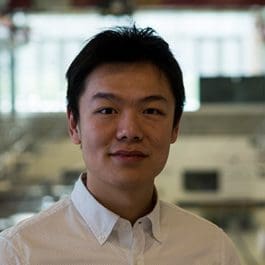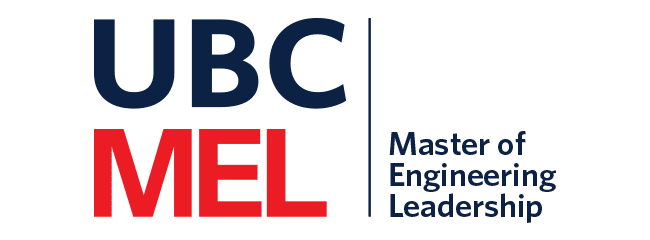
Urban Systems
Alumnus Story — Kevin Chen

Finding ways to make our urban landscape more sustainable and livable requires a big-picture understanding of a range of multidisciplinary issues — from engineering to policy development. Kevin Chen is up to the challenge.
After working in civil engineering for three years on various municipal, commercial and energy projects across Western Canada, Kevin Chen decided to further his education and advance his career. He considered master of science and master of engineering programs, but the multidisciplinary approach of the Master of Engineering Leadership (MEL) in Urban Systems program made it the clear choice.
“The program aligned with my interest in infrastructure and the enjoyment I get from projects that require you to have an integrated understanding of complex systems,” he says.
A multidisciplinary approach, grounded in real-world projects
One of his first classes immersed him in the interconnected and multidisciplinary issues that are inherent in urban systems. “The urban systems and society class, taught by Dr. Jordi Honey-Roses, was excellent and analyzed real-world cases from a socioeconomic and cultural perspective, which isn’t explored in most engineering programs” he says. “We studied project management, procurement mode analysis and financial modelling, getting a comprehensive view of how infrastructure projects are managed throughout their life cycle.”
The Urban Systems Engineering and Asset Management classes explored stakeholder engagement, systems thinking, data-based decision making and infrastructure integration — all issues that need to be considered when designing and managing urban systems.
Students had many opportunities to work on projects with local municipalities. They developed a series of concepts and recommendations for the City of New Westminster’s intelligent transportation, smart cities and district energy strategies. They also drafted asset management plans for the City of Vancouver’s road pavement system, UBC campus utilities and the City of West Vancouver’s road assets.
In another class, Kevin was part of a team that provided the City of Edmonton with concepts for developing a brownfield site near the city core that had been home to an airport until 2012. The group presented two design proposals incorporating a range of innovative ideas to reduce energy and water use, improve transportation options, and promote community well-being and a more livable city.
And closer to home, he was chosen as one of City of Vancouver’s Greenest City Scholars, where he assessed the city’s engineering sustainability practices, identified gaps, mapped out operational bottlenecks and made a set of recommendations.
Developing tools to manage complex problems
Business and leadership classes make up 40 per cent of the Urban Systems program’s curriculum. Kevin says the innovation and strategy class offered through the UBC Sauder’s Robert H. Lee Graduate School was an excellent introduction to management consulting and learning how to handle and manage complexity.
“We explored how to identify the pain points of a complicated problem and come up with workable recommendations,” he says. This sort of structured approach to problem solving is very useful for engineering professionals when addressing complexity as they move into management positions.
Pursuing opportunities beyond the classroom
Kevin says that students in the professional graduate program have an incredible number of opportunities to get involved — and, in the process, gain knowledge and new perspectives.
For example, along with student Ian Li (from the Master of Health Leadership and Policy program) and MBA students, Kevin participated in the Reboot Startup 2017 event, developing a business case for orphaned UBC technology. The team presented to a panel of investors and judges at enterpreneurship@UBC, coming in third overall and providing the students with an invaluable experience.
For another extracurricular project, under the supervision of the former MEL in URSY program director Dr. Martino Tran and UBC SEEDS sustainability planner David Gill, Kevin and classmate Zeshan Nurani leveraged powerful analytics and visualization software to look at ways to use wifi occupancy data to support campus planning and operations.
Ready for new challenges
Now entering the next phase of his career, Kevin is interested in pursuing opportunities where he can apply his skills in finding transformative and sustainable solutions to complex problems in urban infrastructure systems.
“I bring a comprehensive understanding of infrastructure issues combined with knowledge of the business processes and frameworks that can ensure the successful management of these large-scale projects.”
After graduating in December 2017, Kevin has remained involved with UBC through his involvement in the UBC Caninfra Challenge team, where they will be exploring ideas to transform Canada’s infrastructure for the future.
–
Take the steps to join the next cohort of engineering leaders. If you haven’t already, assess your eligibility and sign up for the upcoming information session to learn how to submit a strong application. Learn more about this innovative master’s program:
Application Deadlines
The online application portal for the January 2025 has closed.
Get ready to apply!
Admissions for the 2026 intake will open on January 1, 2025.
How to ApplyJoin us for an
Info Session
Sign up for our latest online information sessions and discover what our programs have to offer.
Sign Up NowAssess your Eligibility
Determine if your professional experience and academic background make you a fit for your desired program.
Start AssessmentApplicant Guide
Navigate the application process with ease!
Sign up to receive tailored instructions and a detailed guide directly to your email.
Sign up


